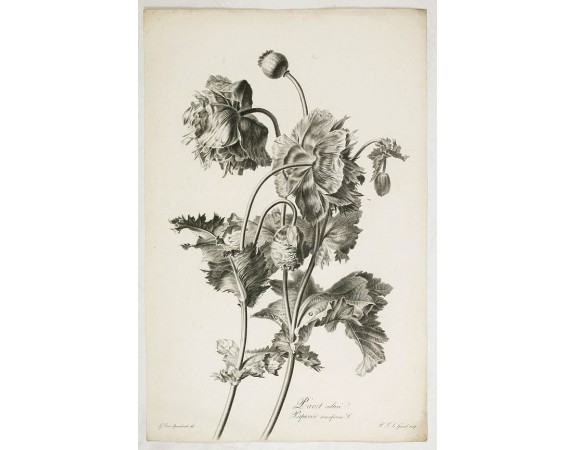SPAENDONCK, Van. G. - Pavot cultivé. Papaver somniferum L.

SPAENDONCK, Van. G. - Pavot cultivé. Papaver somniferum L.
Published: Paris, c.1800
Size: 510 x 335mm.
Color: Uncoloured.
Condition: On white woven paper, size 510x335mm. Good and dark impression. Very good condition.
Description
Bouquet of poppy flowers, stipple engraving by P.F. Le Grand after designs by the Dutch born Gerard van Spaendonck (1746-1822).
Taken from the rare work "Fleurs dessinées d'après nature. . . receuil utile aux amateurs, aux jeunes artistes, aux elèves des écoles centrales et aux dessinateurs des manufactures", containing 25 stipple engraved flower plates.
According to Nissen : "Copies are occasionally found either hand-coloured or printed in colour and retouched with watercolour. . . the watercolour serves in fact to cloak the delicacy of the stipple-work. In their black-and-white state, these prints may well claim to be the finest flower-engravings ever made" (Great Flower Books).
In 1764 van Spaendonck was apprenticed to the decorative painter Guillaume-Jacques Herreyns, in Antwerp. In 1769, Gerard left for Paris and, having been appointed miniature painter to the newly crowned Louis XVI in 1774, he became a candidate for membership of the Académie Royale the following year, making his Salon début in 1777.
In 1780, he succeeded Madeleine Basseporte (1701–80) as professor of flower painting at the Jardin des Plantes. In 1781 he was elected a member of the Académie and began contributing to the Vélins du Roi, a series of botanical studies painted on vellum.
Gerard eventually contributed over 50 such studies (e.g. Hibiscus Flower , 1785; Paris, Mus. N. Hist. Nat.) and in doing so changed from the traditional medium of gouache to watercolour.
The task and the medium were assumed by his famous pupil, Pierre-Joseph Redouté. Van Spaendonck exhibited two of these flower studies on vellum together with five oils at the Salon of 1783 and was highly praised by the critics. At this period he was also active designing for the Sèvres porcelain factory.
Taken from the rare work "Fleurs dessinées d'après nature. . . receuil utile aux amateurs, aux jeunes artistes, aux elèves des écoles centrales et aux dessinateurs des manufactures", containing 25 stipple engraved flower plates.
According to Nissen : "Copies are occasionally found either hand-coloured or printed in colour and retouched with watercolour. . . the watercolour serves in fact to cloak the delicacy of the stipple-work. In their black-and-white state, these prints may well claim to be the finest flower-engravings ever made" (Great Flower Books).
In 1764 van Spaendonck was apprenticed to the decorative painter Guillaume-Jacques Herreyns, in Antwerp. In 1769, Gerard left for Paris and, having been appointed miniature painter to the newly crowned Louis XVI in 1774, he became a candidate for membership of the Académie Royale the following year, making his Salon début in 1777.
In 1780, he succeeded Madeleine Basseporte (1701–80) as professor of flower painting at the Jardin des Plantes. In 1781 he was elected a member of the Académie and began contributing to the Vélins du Roi, a series of botanical studies painted on vellum.
Gerard eventually contributed over 50 such studies (e.g. Hibiscus Flower , 1785; Paris, Mus. N. Hist. Nat.) and in doing so changed from the traditional medium of gouache to watercolour.
The task and the medium were assumed by his famous pupil, Pierre-Joseph Redouté. Van Spaendonck exhibited two of these flower studies on vellum together with five oils at the Salon of 1783 and was highly praised by the critics. At this period he was also active designing for the Sèvres porcelain factory.
1,000€
- Reference N°: 34442
2542 views
 Click on image to zoom
Click on image to zoom
